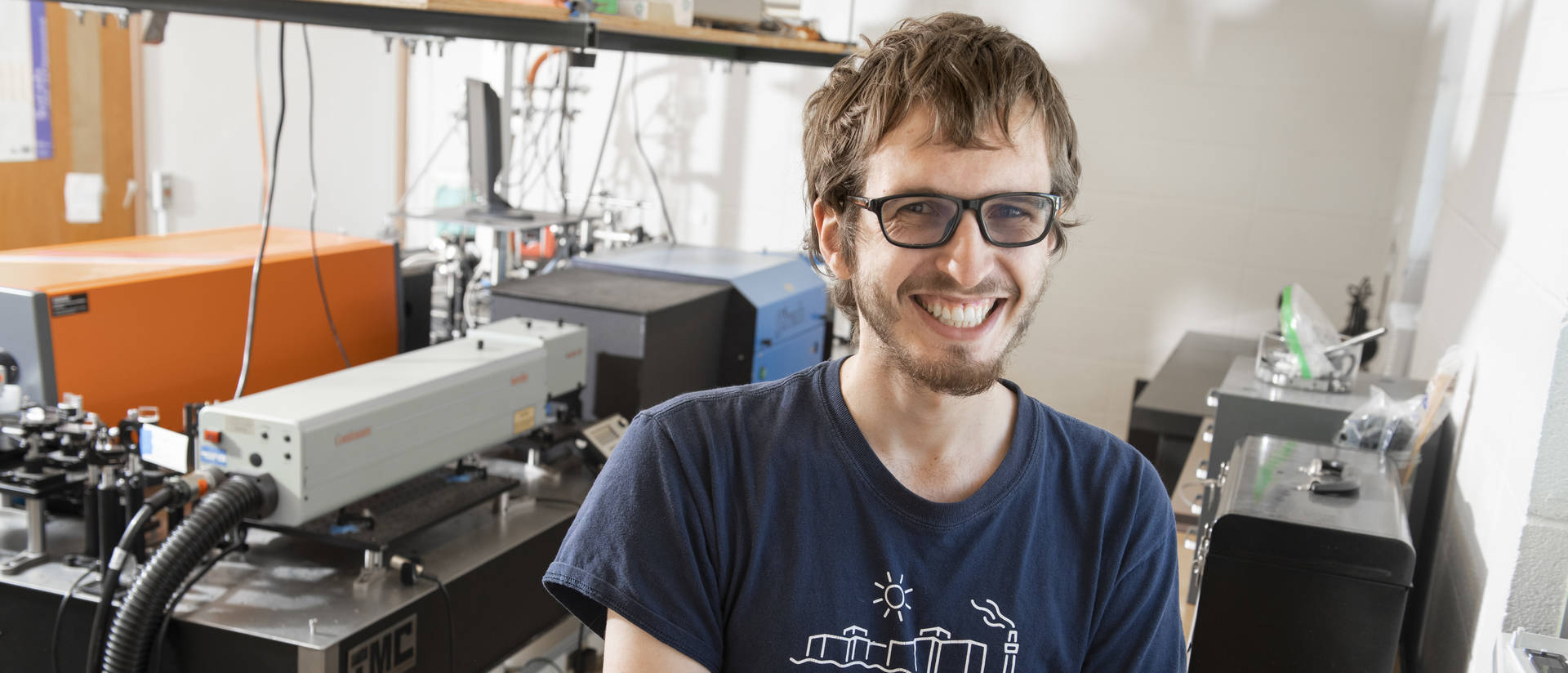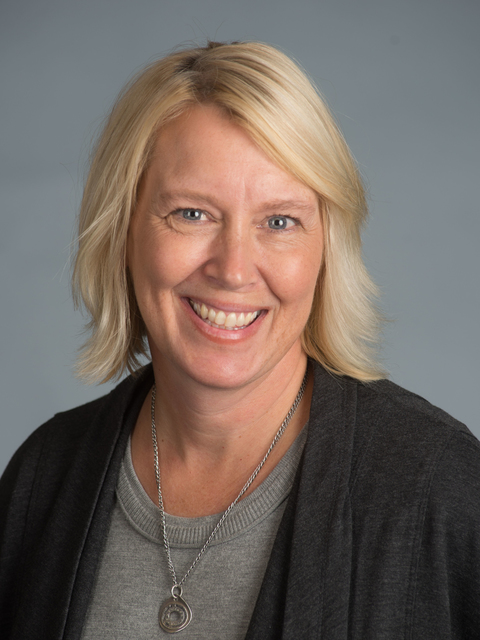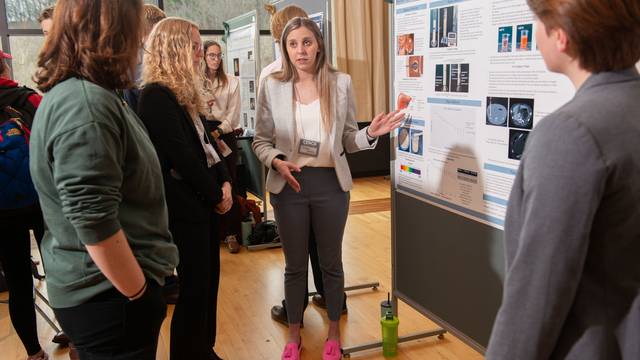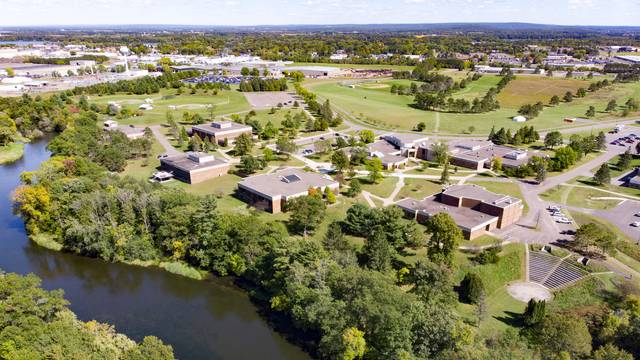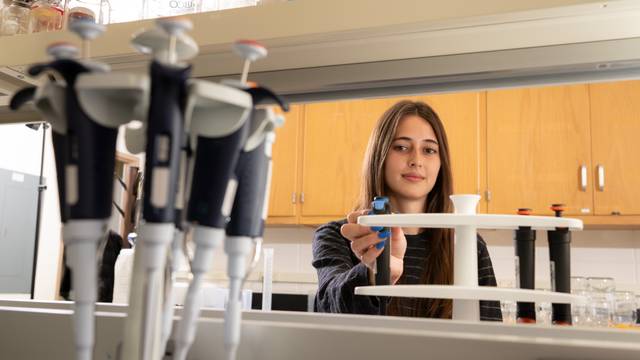Photo caption: As a Blugold, Sean Parsons discovered he has a talent for and a love of teaching chemistry to college students. After he graduates this month, he will begin a Ph.D. program in chemistry, a step toward what he hopes will be a career in higher education.
Sean Parsons spent many hours studying molecules, neutrons and all other things relating to matter during his years as a student at the University of Wisconsin-Eau Claire.
However, when he graduates this month with a major in chemistry and minors in physics and mathematics, it is the lessons he learned as a Blugold that apply to life as well as science that mean the most to him.
The Neenah native says his experiences in and out of UW-Eau Claire’s classrooms taught him about resiliency, how to think creatively, work as part of a team, solve problems and embrace opportunities that take him out of his comfort zone.
As a Blugold, Parsons also discovered his passion for teaching, which he hopes will lead to a career in academia.
In the fall, he will take a step toward becoming a chemistry professor when he begins a Ph.D. program in aerosol chemistry at the University of Southern California.
“I plan to enter academia and become a chemistry professor as it fulfills my love of both teaching and research,” Parsons says. “While I considered taking time off to pursue my passion for teaching and helping others, given the circumstances of COVID-19 and what USC offered me, I could hardly refuse.”
Embracing research and chemistry
Parsons always knew he had a talent for the STEM fields, but he was in high school when he fell in love with chemistry, thanks to challenging AP classes taught by an inspiring science teacher.
“I enjoy chemistry’s duality,” Parsons says. “Chemistry relies on story, fantasy and fiction as a discipline to understand the parts of the universe we cannot see, but it’s also tempered by mathematical rigor. The balance between the two really appeals to me.”
UW-Eau Claire’s strong chemistry programs and the university’s commitment to offering undergraduate students quality research experiences is what brought him to campus, Parsons says.
“Unlike many other universities where undergraduates end up doing the grunt work no one else wants to do, UWEC gives students opportunities to get involved in fulfilling research,” Parsons says.
Once he was a Blugold, he found it easy to connect with chemistry faculty and students, allowing him to build a strong personal and professional network that provided support and opportunities, he says.
For example, one of his first UW-Eau Claire instructors, Dr. Jim Phillips, professor and chair of the chemistry and biochemistry department, encouraged him to find his niche within the chemistry field and helped connect him with a research mentor that aligned with his interests and skills, Parsons says.
“Dr. Jim was a great introduction into chemistry,” Parsons says. “He is down to earth, enjoyable and made me feel at ease. After class and study sessions, he would tell stories and guide us toward opportunities in the department. He was the first person to bring to my attention my proclivity for physical chemistry, a branch of chemistry dealing with chemistry’s underlying mathematics.”
It was Phillips who connected him with Dr. Steve Drucker, a professor in the chemistry and biochemistry department, who became Parsons’ research mentor. For an assignment in Phillips’ class, Parsons had to interview a professor about their research. He chose Drucker, whose research is in physical chemistry.
“When I went into his office, we just struck it off from the start,” Parsons says. “He talked about viewing the bonds between atoms as springs and that these springs could provide insights into how molecules behave. I had little idea about what the details meant, but I was hooked. It captured my curiosity.”
Parsons, who joined Drucker’s research team soon after that initial meeting, says Drucker and their research project have helped him grow as a scientist and as a student.
“Near the start of my college career, I enjoyed the super chill, mini lectures he’d give me on topics beyond those usually covered in his classes due to their complexity or the necessary physics/math background to understand them,” Parsons says. “I enjoyed how those conversations evolved to become more of a back and forth as I started to gain chemistry competence. Throughout everything, Steve was always there for me, always caring for me, always bettering me.”
Drucker says Parsons’ interest in chemistry and research made UW-Eau Claire an excellent fit for him. As a student and a researcher, Parsons consistently exceeded expectations, he says.
“I gave him several tough projects in our research lab, and he mastered them all,” Drucker says. “He was persistently curious and engaged me in many deep conversations about science and broader issues of science in society. As Sean concludes his work in our lab, I regard him not just as a student but a trusted collaborator. His intellectual curiosity and sharp mind will serve him well as he continues his education in the chemistry Ph.D. program at the University of Southern California.”
Parsons says engaging in research is a lot like working to solve current and complex mysteries. It requires patience as well as creative thinking, he says.
“The questions are not textbook questions someone in the 1800s already answered,” Parsons says. “They’re puzzles that require skills beyond those learned in a classroom. Some days in research, nothing will work, nothing will go right and it’s infuriating. But it’s satisfying when you crack a problem that has been plaguing you. I learned how to persevere and to still show up when I was experiencing hardships.”
Research often means learning new skills and finding new ways to think about problems, Parsons says. For example, for his research, he built a computer program though he’s never studied computer science.
“I learned how to learn,” Parsons says. “I taught myself new skills. I was challenged and pushed to the limits of my intellectual abilities. As a result, I grew as a student and a person.”
The computer program he developed helped to modernize his research team’s experimental setup, Parsons says. It was satisfying to create something that helped to move their current research forward, while also knowing that what he created will be used by future Blugold researchers, he says.
Contributing to the climate change discussion
Thanks to a University Honors course, “Taking the Measure of Sustainability,” Parsons also was involved in research relating to climate change.
During the course, students collected data for the greenhouse gas inventory UW-Eau Claire completes as part of its pledge to reach carbon neutrality by 2050.
“While the actual analysis was fairly straightforward, we used a skill scientists sometimes don’t get enough practice in — communication,” Parsons says of gathering the data from people on campus.
That class project was the first time he applied his scientific knowledge, and the knowledge he had acquired in other classes, to sustainability and its link to climate change, Parsons says.
“I started to think about science’s role in society and its connections to the greater world rather than just as a secluded discipline in itself,” Parsons says. “This class helped to bring out the activist in me that I never knew existed. I learned I could take my scientific knowledge and apply it to something greater than just doing science for science’s sake — although there’s nothing wrong with that.”
At the end of the semester, Parsons told Dr. Jim Boulter, a professor of chemistry who teaches the Honors course, that he wanted to continue to work on the project. Boulter, who was writing the greenhouse gas inventory, invited Parsons to be part of the project.
The goal was to compress the data students had collected into a coherent narrative primarily for non-scientists, Parsons says. He says it was educational to review dense, scientific texts, pull out critical information and then organize it in a way that non-scientists could understand.
“I have never been an organized person; usually the only person who needed to understand my work was myself,” Parsons says. “This project helped me to become more organized, which has carried over into my daily life.
“Since the people reading it are not scientists, we had to explain things in a way that, while not condescending, does not assume too much. Learning to write with an audience in mind will be useful in all my communications moving forward.”
Finding a love for academia
While undergraduate research has been a huge part of his college experience, Parsons says he also appreciates that Blugolds are encouraged to pursue multiple passions.
“I enjoy getting a truly interdisciplinary education,” Parsons says. “I’ve had the chance to explore and find areas of interest I never knew I had, like enjoying plays and musicals. My education exposed me to many interesting thoughts and experiences, which are helping to shape me as a person.”
Among those experiences was working as a chemistry tutor, something he began doing as a freshman. At first, his goal was to fulfill the 30 hours of service-learning the university requires to graduate, but it soon became about much more, he says.
“I found what I think is my purpose in life,” Parsons says. “It’s fulfilling to help people solve problems, and also to help them realize their full potential.”
As a tutor, he discovered that often people struggle not because they cannot understand the subject matter, Parsons says, but because they lack confidence. His goal became to help them with their homework, but also to guide them to figure it out on their own, he says.
As more students sought him out as a tutor, he began thinking about a career in academia.
“Using my abilities for such a constructive cause brought me happiness and joy in a way that I’ve never experienced before,” Parsons says. “I felt useful, respected and valued. I found something I love.”
This year, Parsons also had the opportunity to work as a tutor for the Honors course “Interdisciplinary Perspectives.” He tutored students, but he also worked alongside Dr. Heather Fielding, director of the Honors Program, as she created the innovative course.
For the course, Fielding had 10 professors from nine disciplines share their expertise and perspectives on COVID-19.
“We covered everything from immunology to sociology to mathematics to art and everything in between,” Parsons says of the class. “It has been an eye-opening experience. For instance, we were asked to consider the reasons why someone might not get a vaccine. An incredible number of variables are at play, from trust in government, different educational opportunities, scientific storytelling, the human yearning for peace/order in a chaotic world and the storytelling this gives rise to, inequality, privilege and so much more. These are perspectives I would not have had without an interdisciplinary experience like this class.”
Fielding invited Parsons to be part of the course, including planning curriculum and drafting assignments, as well as logistics, running parts of class and grading assignments.
“It was a truly comprehensive teaching experience,” Parsons says. "I've had so much fun being part of it despite the stress of trying to manage the hectic class structure. Dr. Fielding has been a role model for me. She challenged my ideas and inspired me to work hard to make this an amazing opportunity.”
Parsons also was a leader in ACS-SA, the student chemistry club. He says the experience helped him grow his organization, communication and leadership skills, all things that will help him in his future career.
Phillips says Parsons clearly grew from the experience, while also strengthening the student organization.
"He was incredibly strong academically from the get go, but what has truly impressed me over the last year is how his leadership and broad perspective on human-centered issues truly blossomed during his year as president of the ACS-SA," Phillips says. "I worked with Sean and his comrades in that group on several initiatives over the past year, and his personal growth was an incredible thing to witness."
Advice for future Blugolds
Parsons says the most important things future Blugolds can do is to get involved and to step outside their comfort zones. That’s the only way they will find their own interests and path forward, he says.
“Go with the flow, keep your plans flexible and don’t take yourself too seriously,” Parsons says. “Use this opportunity to get to know yourself and find what you enjoy. You never know what opportunity is going to come your way that provides you with immense fulfillment and satisfaction that you never saw coming.”
